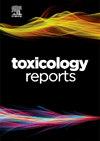Development of therapeutic supplement using roasted-cashew-nut to protect cerebral vasoconstriction injury triggered by mixture of petroleum hydrocarbons in the hypothalamus and hippocampus of rat model
Q1 Environmental Science
引用次数: 0
Abstract
Petroleum-related activities have been a health global risk concern, particularly in the limbic disorders. The study aims to investigate the neuroprotection of roasted cashew nuts (RCN) on brain vasoconstriction injury induced by a mixture of petroleum hydrocarbons (MFPP). Seventy Male Wistar rats ranging 160 ± 10 g were randomized into seven groups. Group I was given distilled water. Group II was exposed to 0.2 ml MFPP. Group III, IV and V were exposed to 0.2 ml MFPP followed by treatment with 50 mg/kg atenolol, 10 % RCN and 20 % RCN, respectively. Group VI and VII were treated with 10 % RCN and 20 % RCN, respectively. The regimen period was 28 days. Cell pathological evaluation was done using hematoxylin and eosin staining and visualized under the microscope. Biochemical and molecular markers of brain vasoconstriction injury (BVI) were evaluated using spectrophotometer and RT-PCR analyzer, respectively. Student-T-test and one-way analysis of variance (ANOVA) were used to analyze the results. Sub-chronic exposure to MFPP induced BVI as evident in neuroinflammation and derangements in the histology of the hippocampus and hypothalamus coupled with momentous alterations in the neurons. Post treatment with RCN supplement remarkably modulated the effects by depleting the inflammatory mediators including HIF-1, p53 and MCP-1. Also, adenosinergic, purigenic and cholinergic of the hypothalamus and hippocampus were normalized by the supplement. It is pertinent to conclude that treatment with RCN inhibited BVI in rats via the NO-cAMP-PKA signaling pathway by reversing neuroinflammation, normalizing the purinergic and cholinergic neurotransmission in the hypothalamus and hippocampus, and stabilizing NO level coupled with brain histology improvement.
烤腰果对石油烃混合物致大鼠下丘脑和海马血管收缩损伤的保护作用
与石油有关的活动一直是一个全球健康风险问题,特别是在边缘障碍方面。本研究旨在探讨烤腰果(RCN)对石油烃混合物(MFPP)所致脑血管收缩损伤的神经保护作用。雄性Wistar大鼠70只,体重160 ± 10 g,随机分为7组。第一组给予蒸馏水。II组暴露于0.2 ml MFPP。III组、IV组和V组分别暴露于0.2 ml MFPP,然后分别给予50 mg/kg阿替洛尔、10 % RCN和20 % RCN。VI组和VII组分别给予10 % RCN和20 % RCN。治疗期28 d。采用苏木精和伊红染色进行细胞病理评价,并在显微镜下观察。分别用分光光度计和RT-PCR仪检测大鼠脑血管收缩损伤(BVI)的生化和分子标志物。采用学生t检验和单因素方差分析(ANOVA)对结果进行分析。亚慢性暴露于MFPP诱导的BVI表现为神经炎症和海马和下丘脑的组织学紊乱,并伴有神经元的重大改变。治疗后补充RCN通过消耗包括HIF-1、p53和MCP-1在内的炎症介质显著调节效果。此外,下丘脑和海马的腺苷能、纯化能和胆碱能也被补充正常化。由此得出结论,RCN治疗通过NO- camp - pka信号通路抑制大鼠BVI,逆转神经炎症,使下丘脑和海马的嘌呤能和胆碱能神经传递正常化,稳定NO水平并改善脑组织组织学。
本文章由计算机程序翻译,如有差异,请以英文原文为准。
求助全文
约1分钟内获得全文
求助全文
来源期刊

Toxicology Reports
Environmental Science-Health, Toxicology and Mutagenesis
CiteScore
7.60
自引率
0.00%
发文量
228
审稿时长
11 weeks
 求助内容:
求助内容: 应助结果提醒方式:
应助结果提醒方式:


